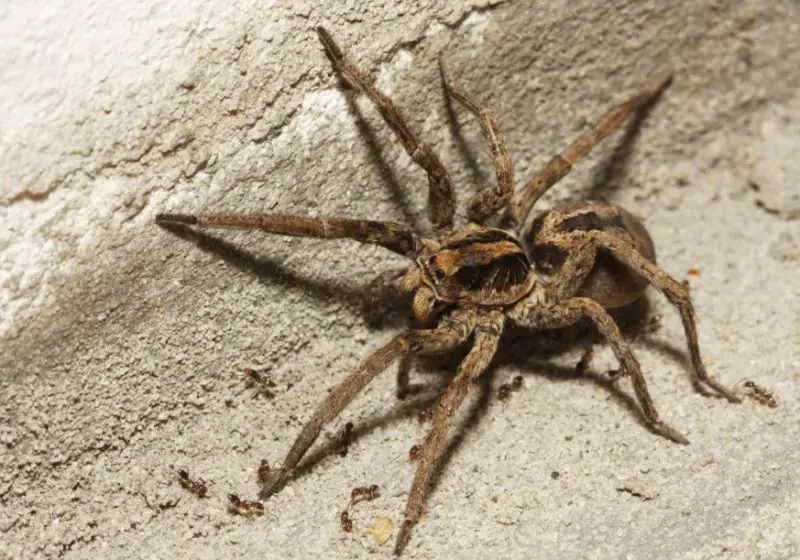Wolf spiders are common in many parts of the world and often evoke fear due to their large size and intimidating appearance. But are wolf spiders truly dangerous?
This guide provides a detailed look into their behavior, potential risks, and how to handle encounters with these arachnids. Read on to separate myths from facts and learn what you need to know about wolf spiders.
What Are Wolf Spiders?

Wolf spiders belong to the Lycosidae family, which includes over 2,000 species. They are known for their robust build, excellent hunting skills, and unique characteristics:
- Appearance: Wolf spiders range from 0.4 to 1.2 inches in size. They have a hairy body, often brown, gray, or black, with distinctive patterns that help them blend into their surroundings.
- Eyes: These spiders have eight eyes arranged in three rows, with the middle row featuring two large eyes that give them excellent vision, especially in low light.
- Habitat: Wolf spiders are ground dwellers, commonly found in forests, grasslands, gardens, and sometimes homes.
Unlike web-building spiders, wolf spiders actively hunt their prey instead of waiting for it to get trapped in a web.
Are Wolf Spiders Dangerous to Humans?
Do Wolf Spiders Bite?
Yes, wolf spiders can bite, but they rarely do so unless provoked or cornered. They are generally non-aggressive and prefer to flee rather than attack. Bites typically occur when:
- A wolf spider feels threatened.
- It is accidentally handled or trapped, such as inside clothing or bedding.
Symptoms of a Wolf Spider Bite
A wolf spider bite may cause mild to moderate symptoms, including:
- Pain and Redness: The bite area may feel like a bee sting, with redness and swelling.
- Itching or Irritation: Some people experience itching or a rash around the bite.
- Minor Reactions: In rare cases, mild nausea or dizziness may occur.
Wolf spider venom is not lethal to humans. Unlike more dangerous spiders like the black widow or brown recluse, their venom is designed to subdue small prey and poses little threat to healthy adults.
Are Wolf Spiders Dangerous to Pets?
Wolf spiders are unlikely to harm pets such as dogs or cats. A curious pet might get bitten if it pesters a spider, but the venom is not strong enough to cause serious harm. Symptoms in pets are similar to those in humans, including localized swelling and irritation.
If your pet shows unusual symptoms after a spider bite, such as vomiting or lethargy, consult a veterinarian to rule out an allergic reaction.
Wolf Spiders in the Home: Should You Be Concerned?
Wolf spiders occasionally enter homes while searching for prey or shelter. Here’s what you need to know:
- Are Wolf Spiders Dangerous Indoors?
No, wolf spiders are not dangerous inside your home. They actually help control pests by hunting insects like roaches, flies, and moths. - How to Identify a Wolf Spider in Your House
Wolf spiders are often mistaken for other spiders, like the brown recluse. A key distinguishing feature is their prominent eye arrangement and lack of a violin-shaped marking on their body.
How to Prevent Wolf Spider Infestations
Although wolf spiders are not dangerous, you may still prefer to keep them out of your living space. Follow these tips to prevent an infestation:
- Seal Entry Points: Repair cracks in windows, doors, and walls to prevent spiders from entering.
- Remove Clutter: Clear piles of wood, leaves, and debris around your home where spiders may hide.
- Maintain Cleanliness: Regularly vacuum and dust corners, basements, and garages to eliminate hiding spots.
- Use Natural Repellents: Essential oils like peppermint or eucalyptus can deter spiders.
- Install Outdoor Lighting Wisely: Minimize outdoor lighting, as it attracts insects, which in turn draw spiders.
What to Do if You Encounter a Wolf Spider
If you spot a wolf spider in your home or yard, here’s how to handle it:
- Remain Calm: Wolf spiders are more afraid of you than you are of them.
- Gently Relocate: Use a glass and a piece of cardboard to trap and release the spider outside.
- Use a Vacuum: For quick removal, vacuum the spider and release it outside if possible.
- Avoid Killing: Wolf spiders play an essential role in controlling pest populations.
Myths and Misconceptions About Wolf Spiders
- Myth: Wolf spiders are highly venomous.
Fact: Wolf spider venom is mild and not dangerous to humans. - Myth: Wolf spiders are aggressive.
Fact: They are shy and only bite when provoked. - Myth: Wolf spiders infest homes in large numbers.
Fact: Wolf spiders are solitary and do not form webs or colonies indoors.
Are Wolf Spiders Dangerous Compared to Other Spiders?
When compared to other spiders, wolf spiders are relatively harmless:
- More Dangerous Spiders: Species like black widows or brown recluses pose a higher risk to humans due to their potent venom.
- Helpful Predators: Wolf spiders are beneficial because they help control pest populations in natural and residential settings.
When to Seek Medical Attention After a Wolf Spider Bite
Although rare, some individuals may experience severe reactions to a wolf spider bite. Seek medical attention if you notice:
- Intense pain or swelling that worsens over time.
- Signs of an allergic reaction, such as difficulty breathing or hives.
- Symptoms of infection, such as pus or increasing redness around the bite.
Conclusion: Are Wolf Spiders Dangerous?
In summary, wolf spiders are not dangerous to humans or pets. While they may look intimidating, these solitary hunters are beneficial to the ecosystem and rarely pose a threat. Understanding their behavior and characteristics can help you coexist peacefully with these misunderstood arachnids.
If you encounter a wolf spider, remember that it’s likely just passing through or helping control unwanted pests in your home. With proper prevention and handling, there’s no reason to fear these fascinating creatures.






